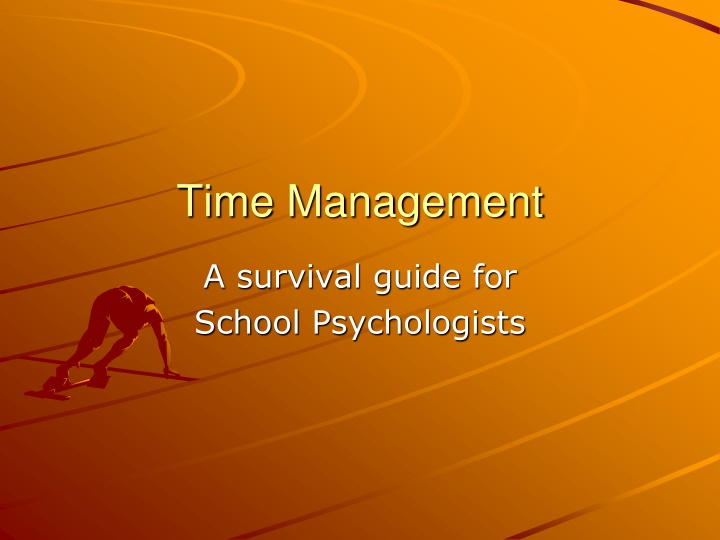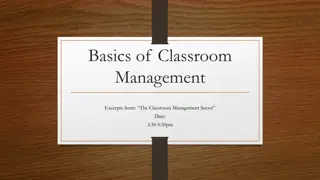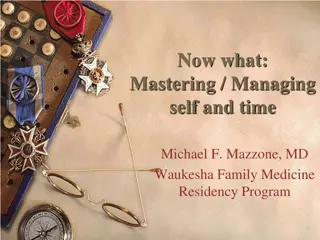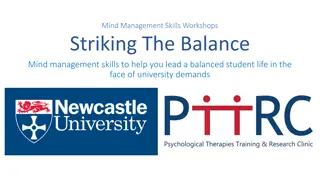Effective Time Management Strategies for School Psychologists
Learn essential time management skills like self-regulation, planning, and setting priorities to accomplish goals, reduce stress, and maintain a sense of control. Understand the difference between important and urgent tasks, monitor your plans regularly, and focus on important activities to enhance efficiency and productivity.
Uploaded on Oct 10, 2024 | 0 Views
Download Presentation

Please find below an Image/Link to download the presentation.
The content on the website is provided AS IS for your information and personal use only. It may not be sold, licensed, or shared on other websites without obtaining consent from the author.If you encounter any issues during the download, it is possible that the publisher has removed the file from their server.
You are allowed to download the files provided on this website for personal or commercial use, subject to the condition that they are used lawfully. All files are the property of their respective owners.
The content on the website is provided AS IS for your information and personal use only. It may not be sold, licensed, or shared on other websites without obtaining consent from the author.
E N D
Presentation Transcript
Time Management A survival guide for School Psychologists
Self-regulation Time management is, at its core, a form of self-regulation Like reading or using a computer, time management involves learning a set of skills and practicing them on a regular basis Time management helps you accomplish your goals and reduce work-related stress
Planning and Setting Priorities Break down your time by the year, month, week and day When creating plans within these time frames, you must set priorities according to two variables: importance and urgency Covey s time matrix is one system used by many professionals to help set priorities
Whats the difference? Important activities are those that are linked to your goals and values Urgent activities require immediate attention TIP 1:Spend time on important, non-urgent activities before they become urgent TIP 2:Don t let your life be ruled by urgency TIP 3:Don t avoid important tasks because of tasks that are urgent but unimportant (AKA procrastination)
Results Focusing exclusively on Important/Urgent tasks leaves you always having to put out fires and feeling stressed Letting yourself be lured into spending time on unimportant and non-urgent activities gets you into hot water and a performance improvement plan Planning ahead and accomplishing important tasks before they are urgent provides a sense of control and balance in your work
Monitor your plans Another aspect of self-regulation is creating plans and keeping track of them Determine what the most important activities are for each day Be sure to allocate enough time to accomplish those tasks Stay focused on important activities by using a to-do list Monitor your time plans on a daily, weekly and monthly basis build enough flexibility into your schedule to accommodate unexpected delays
Reflect Keep track of your accomplishments Nothing feels quite so good as checking off your list a thorny task you ve finally accomplished Evaluate the extent to which you have used your time as planned Consider what you ve spent too much or too little time with, and adjust your plans as needed
School Psychologists Important/Urgent parent phone call, scoring protocol for tomorrow s meeting, report due today, CBM data for team meeting in 2 hours Important/Not Urgent consultation notes, testing students with conferences in two weeks, scheduling RED meeting with IEP team, fidelity check on Tier 2 student intervention Not Important/Urgent interruptions, question about where to go for lunch Not Important/Not urgent surfing the internet, teacher emails Who did you vote for on Idol?
Obstacles Motivational obstacles are more likely to surface when you don t set goals, don t plan how you will reach them, and don t monitor your progress Procrastination is the #1 motivational obstacle to accomplishing your goals Reasons for procrastination are legion: poor time management, negative beliefs, unrealistic expectations and perfectionism
Procrastination Ignoring the task in hopes it will go away Underestimating the work involved in the task or overestimating your resources Deceiving yourself that mediocre performance is acceptable Substituting worthy but lower-priority tasks Believing that minor delays won t hurt you Dramatizing a commitment to the task rather than doing it Perseverating on part of the task
Strategies for Procrastinators Acknowledge that procrastination is a problem, then think about steps you can take to solve the problem Identify your values and goals. How does procrastination undermine those? Work on improving your time management skills. Begin by making plans that are connected to your values and goals.
Strategies Use task analysis and divide important, complex tasks into smaller, more manageable parts. Set sub-goals for completing the parts of the task in a certain order. Give yourself time frames for each sub-goal that will fit into the deadline for the big, overwhelming task. Use behavioral and cognitive strategies you re a school psychologist. You know this stuff!
Behavioral Strategies Identify diversions and distractions Note when and where they occur Can you avoid or diminish those? If not, how can you control their use? Make a contract with yourself Build in rewards for yourself Use the Premack Principle and alternate enjoyable tasks with those that aren t so enjoyable but must be done
Cognitive Strategies Beware of self-seductions that you re incapable of doing something when in reality you just don t want to do it now. Dispute mental diversions like, there s only enough time to do part of it so I ll do something else that doesn t take as much time. Tell yourself, Other things will come up later so I may as well get started now. Don t take on so many responsibilities that you have an excuse for not doing any of them well.
Coveys strategies Set challenging but realistic goals Strengthen the link between your effort and your self-worth Take pride in your effort and minimize social comparisons Have positive beliefs about your abilities You CAN improve your time management skills if you START NOW!
Questions or comments? Thanks, and have a well-managed year!























